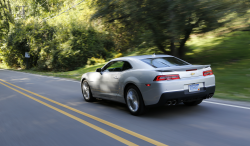
— A General Motors lawsuit filed in Texas alleges the automaker could have manufactured a safer Chevrolet Camaro than it did.
Plaintiffs Rohel Antuan Garcia and his wife Sylvia Rodriguez filed the lawsuit that alleges General Motors and numerous other companies are responsible for a crash that caused Mr. Garcia to suffer third-degree burns to 69 percent of his body.
The claims against GM involve a 2015 Chevy Camaro that hit the truck Mr. Garcia was driving. According to the lawsuit, GM is responsible for the crash because it made a car (the Camaro) that would cross the center line without warning the driver.
The lawsuit says the crash occurred in February 2016 when Antonio Leyva-Monsibais was driving a 2015 Chevrolet Camaro in Texas near the Gulf of Mexico. Plaintiff Antuan Garcia was traveling in the opposite direction on a two-lane road driving a 2015 Kenworth Model T400 truck for his employer. His employer was using the Kenworth, manufactured by PACCAR, as a “water truck."
Defendant David De Los Santos was driving behind Garcia in a 2000 Freightliner tractor-trailer when the Chevy Camaro, driven by Leyva-Monsibais, drifted across the center line and into the lane of the plaintiff, Mr. Garcia.
The Camaro hit the front driver-side of the Kenworth truck driven by Garcia, sending the truck off the road. The tractor-trailer traveling behind Garcia hit the right rear of the Kenworth and dislodged the water tank, forcing it into the cab where Garcia was sitting.
According to the lawsuit, the investigating police officer said there were two factors that caused the crash. One was the driver of the Camaro that crossed the center line, Leyva-Monsibais, and the other was the driver of the tractor-trailer that had been following behind Mr. Garcia.
Garcia's burns occurred because the fuel tank of his truck ruptured and caught fire, and the dislodged water tank that entered the cab of Garcia's truck caused the doors to jam. Mr. Garcia made it out of the truck and was taken to a burn unit where he stayed for the next four months.
The plaintiff says his fingers and right thumb had to be amputated and he endured months of skin grafts and other surgeries before finally returning home. According to the lawsuit, Garcia made it home to his family, but he suffers from scars, disfigurement, constant pain and depression.
Although the lawsuit does blame the driver of the Camaro for "failing to maintain his vehicle safely in his lane and as a result crossing the center line into on-coming traffic," the lawsuit says General Motors also caused the crash.
According to the lawsuit, GM caused the crash because the Camaro wasn't equipped with an "active safety system to warn or prevent an unintended lane departure..." In other words, GM shouldn't have manufactured and sold a car without a system to warn or prevent a driver from accidentally crossing the center line.
The plaintiff doesn't blame the driver of the Camaro for buying a car without certain safety features, but because the Camaro wasn't equipped with certain safety features, the lawsuit says the "Camaro was defective and dangerous."
The lawsuit says General Motors had been designing and manufacturing cars with active safety features for years before it made the 2015 Camaro involved in the crash, but chose not to include those features on the car. The plaintiff says the crash would not have occurred if GM would have equipped the Camaro with "lane departure warning" and "lane keep assist" systems.
The plaintiff says a lane departure warning system would have warned the Camaro driver the car was crossing the center line, and a lane keep assist system would have automatically turned the steering wheel to keep the Camaro in the correct lane.
By not equipping the Camaro with available safety systems, the car was allegedly "defective" and "in an unreasonably dangerous condition" from the time it was built.
The lawsuit also says GM knew or should have known that distracted drivers may cause crashes, injuries and deaths, so the automaker "had a duty to reasonably protect against that foreseeability."
The Chevy Camaro lawsuit was filed in the District Court of Dallas County, Texas - Rohel Antuan Garcia, et. al., v. General Motors, LLC, et. al.
The plaintiffs are represented by Aldous \ Walker, the Gilbert Law Group, P.C., and Sandoval James, PLLC.




